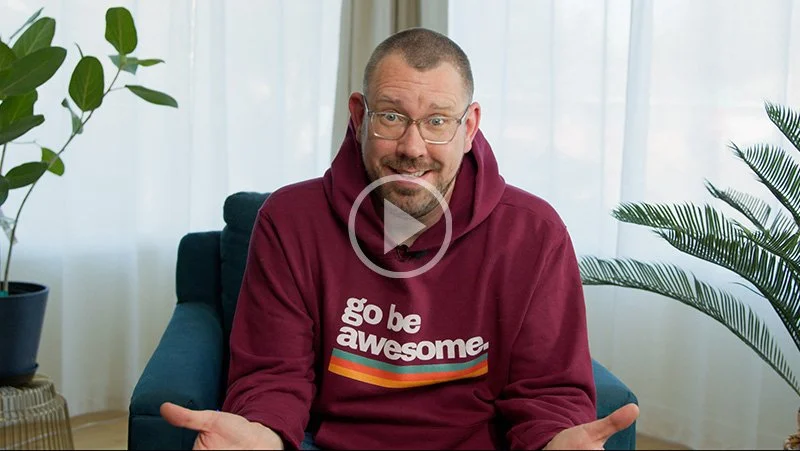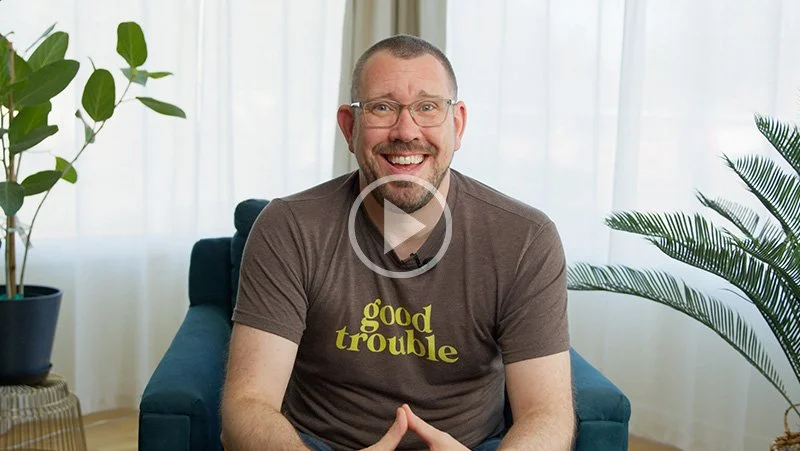Creating Great Work Life Balance for Teams
Welcome to the #culturedrop. Every Tuesday, Galen Emanuele emails tools to advance leadership skills, team culture, and personal growth. No spam, just great content. Sign up now to get it in your inbox.
Today’s topic: creating great work-life balance for employees. This one is going to be pretty personal about how I run this company, manage our team, and what I’ve seen other companies do that’s really effective.
“Work life balance for employees really benefits both individual employees and the organization as a whole.”
Work life balance for employees really benefits both individual employees and the organization as a whole.
Creating work-life balance: my philosophy
Now, first of all, I realize that I have a small company — other organizations are different sizes, have different complexities, are in different industries, and have different roles and dynamics inside the organization than what I’ve got here. That being said, I think that the underlying principles and philosophy are sound, even in a company that looks wildly different than my own.
I also want to say as a disclaimer that this isn’t an advertisement for how wonderful I think I am; I just truly think this is the recipe for getting work life balance right. I see this work every day in dedicated, hard working employees who also have lives outside of their jobs and contribute a lot without feeling burned out or resentful to work for a company that doesn’t care about them as human beings.
Alright, here’s my two cents.
It starts with employee value.
For my company, building a work-life balance stems from how I think about salaries and compensation at a high level and 10,000 foot perspective.
When I think about the salaries that my employees make, I don't focus on how much they make per minute or hour of them being productive doing XYZ tasks throughout the day for X amount of hours. Instead, I focus on output, projects, and production.
I see compensation and benefits as what I'm paying as an organization to have a person in this role and to produce the work that I expect them to contribute over a year, or six months etc. My focus as a company is on output and production, I don't keep track of the individual days and hours that people work. I honestly don't really care.
We set goals and are proactive about the work that needs to get done, and they know exactly what they’re responsible for.
“Do what you need to do.”
What I do care about is people being productive and getting stuff done. How and when they do it is of little consequence to me.
“What I do care about is people being productive and getting stuff done. How and when they do it is of little consequence to me.”
If someone wants to take a day off, or half a day off to do whatever they’d like, go for it. My employees do not need permission to take a Friday off and go to the beach with their friends or to go to a concert, or to take some extra days and extend a vacation that they’re on.
I just ask them to make sure to get the work done that they’re responsible for, and then let them take ownership to do that.
Balance reward with expectation
That flexibility in their time is balanced with an understanding that our culture here is one where when it's time to get shit done, it's foot on the gas, and we get it done. And in return I offer a lot of reward — I pay people well and offer generous benefits like unlimited PTO.
Employees are expected to take full ownership over their projects and they’re held accountable for producing high-caliber work. When I say to my team "Foot on the gas, I need these projects done and for you to be accountable," they do it. They are compensated well, and I give them a lot, which gives me the runway as a leader and as a company to ask a lot of them in return.
My philosophy really comes down to this: high bar, high reward.
Hire and keep the right people.
“I don’t pretend that working for my company is the most important thing that exists in my employees’ lives, because it’s not.”
I hire highly accountable, intelligent, competent people who are emotionally intelligent and then I let them do their thing. I give them what they need and stay out of their way. What I feel that I am most responsible for is to make sure that we have a great environment to work in, that we have an exceptional culture, and to keep them happy and feeling supported, challenged, etc.
I see and treat my employees as human beings first. They have lives, they have families, they have all kinds of personal things going on. I don't pretend that working for my company is the most important thing that exists in my employees' lives, because it’s not. They don't own this company. I do. They're contributing their time and talent, and they understand from day one that there's a high bar here for them.
How is this work life balance?
All of this contributes to a better work life balance because work is integrated and incorporated into my employees' lives. If they need to leave work at 2pm, or go pick up their kid, or live their lives, they never have to ask permission from me.
I want them to thrive in their own lives so that they can come to work and be awesome. I encourage my employees to have boundaries, to take care of themselves personally and do what they need to do to be fully intact.
I acknowledge and allow them to be fully human so they can come to work and kick ass here.
High bar, high reward.
“When companies and leaders honor people, treat them as human beings, pay them as well, and prioritize their experience, they gain the right (I think) to ask a lot of those people.”
It's high bar and high reward. I feel I can ask a lot of my people because I give them a lot and always have their backs. I prove it through how I show up as a leader: I will always say yes, or look for ways to say yes to them. I empower them, I support them, I compensate them well. And in return, what I see happen in real-time is that my employees also give back. They give discretionary effort. They work hard, they make sure stuff gets done, and try harder than they have to because they care.
The reason that they care is that they know that I as their leader, and this company cares about them. When companies and leaders honor people, treat them as human beings, pay them as well, and prioritize their experience, they gain the right (I think) to ask a lot of those people.
When we talk about "Work Life Balance", I think there is a huge parallel there for "Reward & Accountability Balance.” Approaching it this way creates a recipe where everybody tries hard, takes care of themselves, and kicks ass together.
Want more?
This article was created by Galen Emanuele for the #culturedrop. Free leadership and team culture content in less than 5 minutes a week. Check out the rest of this month's content and subscribe to the Culture Drop at https://bit.ly/culturedrop








